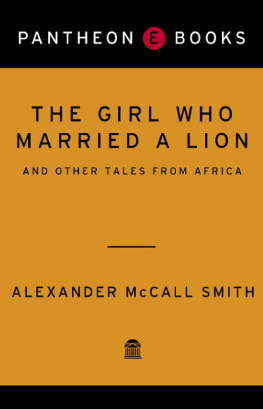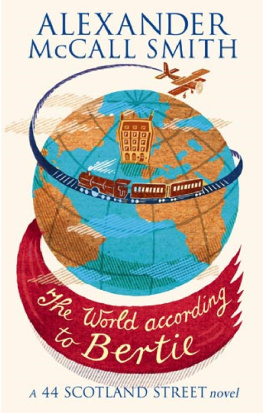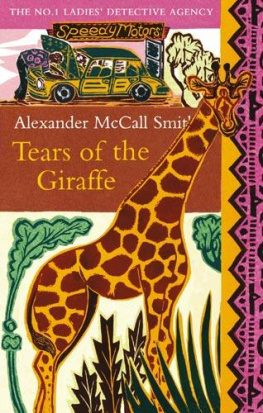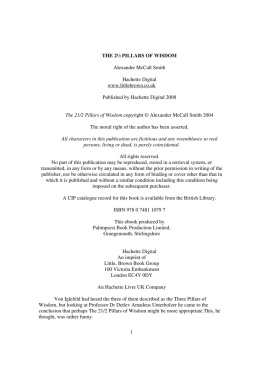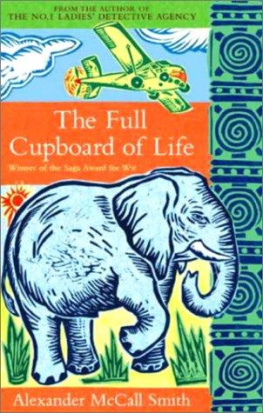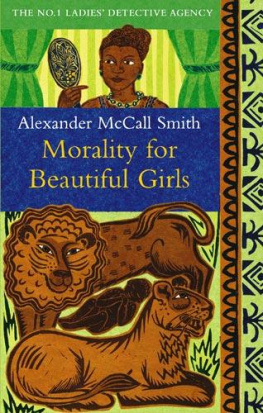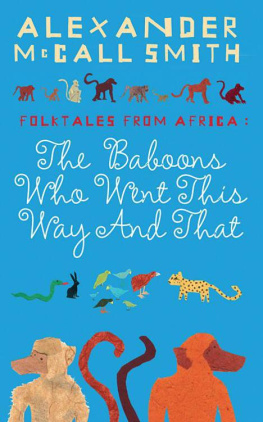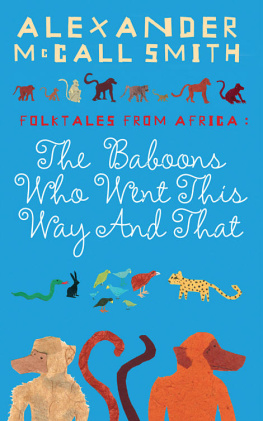
This book has been optimized for viewing at a monitor setting of 1024 x 768 pixels.
BOOKS BY ALEXANDER MCCALL SMITH
IN THE NO. 1 LADIES DETECTIVE AGENCY SERIES
The No. 1 Ladies Detective Agency
Tears of the Giraffe
Morality for Beautiful Girls
The Kalahari Typing School for Men
The Full Cupboard of Life
IN THE SUNDAY PHILOSOPHY CLUB SERIES
The Sunday Philosophy Club
IN THE PORTUGUESE IRREGULAR VERBS SERIES
Portuguese Irregular Verbs
The Finer Points of Sausage Dogs
At the Villa of Reduced CircumstancesThe Girl Who Married a Lion and Other Tales from Africa THE GIRL WHO
MARRIED A LION
d
THE GIRL WHO
MARRIED A LION
and Other Tales from Africa
ALEXANDER MCCALL SMITH
Pantheon Books, New York
Copyright @ 1989, 1999, 2004 by Alexander McCall Smith All rights reserved under International and Pan-America Copyright Conventions. Published in the United States by Pantheon Books, a division of Random House, Inc., New York, and simultaneously in Canada by Random House of Canada Limited, Toronto.
Pantheon Books and colophon are registered trademarks of Random House, Inc.
Most of the stories in this collection were previously published in Great Britain in Children of Wax by Canongate Publishing Limited, Edinburgh, 1989, and subsequently in the United States by Interlink Publishing Group, Inc., Brooklyn, in 1999.
Library of Congress Cataloging-in-Publication Data McCall Smith, Alexander, [date]
The girl who married a lion and other tales from Africa /
Alexander McCall Smith.
p.
cm.
eisbn 0-375-42344-3
1. Ndebele (African people)Folklore.
2. Tswana (African
people)Folklore.
3. TalesZimbabwe.
4. Tales
Botswana.
I. Title.
gr358.62.n34m23 2004
398'.089'963989dc22
2004052231
Visit our web site at: www.pantheonbooks.com
Book design by M. Kristen Bearse
v1.0
This book is for
Finola OSullivan.
CONTENTS
vii
C o n t e n t s
viii
INTRODUCTION
This is a collection of traditional stories from two countries in AfricaZimbabwe and Botswana. These countries are neighbours, and although they differ from one another in ethnic and linguistic terms, they share many of the folktales which are found throughout southern Africa. This sharing of oral literature is not uncommon. Folktales the world over have a strik-ing number of common features, and many familiar themes crop up in folk traditions that are otherwise culturally very different. In a sense, then, these tales are part of a universal language which can speak to people across human frontiers, just as music does.
There are many fine collections of sub-Saharan African folktales, many of them compiled by scholars of oral literature. I do not count myself amongst such expertsfar from itand this collection therefore makes very modest claims. In order to present the stories in a way which will interest and entertain a broad reader-ix
I n t r o d u c t i o n
ship, I have deliberately taken certain liberties with retelling, added some descriptions of landscape, and deepened the treatment of certain emotions. I hope that in doing so I have been able to bring out the beauty and poetry of these stories. A word-for-word transcription would not necessarily do them justice in that respect.
I collected many of these stories myself some twenty years ago in the southern part of Zimbabwe known as Matabeleland. These stories were told to mewith the assistance of an interpreterby people living in the Matopo Hills, to the south of Bulawayo. They were also recounted to me by people in Bulawayo itself.
Sometimes they were told by old peopleby grandmotherssometimes by children. It was a particular pleasure to hear the stories from children, as they told them with such spirit and enjoyment. All of these stories were recounted to me with generosity and warmthqualities which those who know that part of Africa, or even just visit it briefly, will recognise as being so typical of the people there.
I have expanded this original collection of stories, published some years ago under the title Children of Wax, to include stories from Botswana. These stories were obtained for me from people living in the Mochudi and Odi areas of Botswana. They were collected by Elinah Grant, a friend of mine, who runs a small x
I n t r o d u c t i o n
museum in Mochudi. Elinah translated the stories from Setswana into English, and I am most grateful to her for her labours. Again, I have retold them, using some of the original language and some of mine.
And what wonderful things are contained in these stories! Not only do we find all the familiar human emotionsjealousy, ambition, lovebut we see moral rules set out very clearly. We see loyalty rewarded; we see greed punished; we see the encouragement of those values of community which are so important in Africa and from which we can learn so much. But we are shown more than that: we are introduced to a fas-cinating worldview in which the boundaries between the animal and human worlds are indistinct and fluid.
This is a traditional African vision, but it is also something very modern that we are only beginning to understand in western countries. We are not the mas-ters of naturewe are part of it.
The two countries from which these stories are drawn are remarkable places. The people who inhabit them are generous-spirited and have a superb sense of humour. In these stories we are afforded a glimpse of the values and traditions that have made their societies what they are. These stories speak to us from the African heart. I count myself fortunate indeed that I have been given the chance to hear them and to help pass them on to others. But the stories remain the xi
I n t r o d u c t i o n
property and creation of those who told them to me, and any credit is theirs alone.
But let us pass from these serious matters to the true business of this book. How can a girl possibly have married a lion? How can a man have a tree growing out of his head? And how can a woman have children made of wax? The stories in this collection make these questions seem simple, everyday oneswith, as it happens, simple, everyday answers.
Alexander McCall Smith
xii
A LETTER FROM MMA RAMOTSWE
When I was a very young girl in Mochudi, I listened to stories just like the ones in this book. They were told to me by my fathers aunt, who was very old then and who is now late. She was a very kind woman, and she knew many stories, which she had told to my father, Obed Ramotswe, when he was a small boy. That is how these stories are remembered in Botswana, and in many other countries in Africa.
When I hear these stories, they make me sad. That is not because they are stories of sad things that have happened; it is because they remind me of the Africa of my childhood and of all the good things that there were then. Everybody feels a little bit sad when they think of their childhood, because the world we knew then seems so far away. Looking back is like looking through a window which is covered with dust: you can just make out the faces, but nothing is very clear.
But then you hear these old storiesthe stories that you heard so many timesand suddenly everything xiii
A L e t t e r f r o m M m a R a m o t s w e comes back. You are there again, sitting with your aunt outside her house, and it is quiet, and the sky is empty and the sun is on the land. And you think: I am a lucky person to be here, to be listening to these things that happened in another place, just round the corner, in the days when the animals could speak. And the sadness goes away and your heart is full again.
Next page
